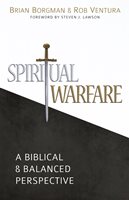Pastors Brian Borgman (Grace Community Church in Minden, NV) and Rob Ventura (Grace Community Baptist Church in North Providence, RI) have teamed up to provide a practical exposition of Ephesians 6:10-20, the apostle Paul’s famous portrait of the Christian life as one of spiritual warfare. Recently we featured an enthusiastic review of the book, and today the authors are here to talk about their work.
Books At a Glance (Fred Zaspel):
Let’s begin with definitions. What exactly do you mean by “spiritual warfare?”
Borgman & Ventura:
Spiritual warfare is a biblical worldview issue. We live in a universe that is both physical and spiritual. God is active in our world and in our lives, and so are Satan and his forces. In a broad perspective, spiritual warfare is a whole-life view. Constantly we are in a battle with an intertwined threefold enemy, the world, the flesh and the devil. As we live between the already and not yet aspects of our salvation, we are at war, all the time. So spiritual warfare is not some narrow perspective that relates only to certain kinds of temptations, let alone “power encounters,” but it is a constant reality for us. It is where we live as Christians from the very day we were converted.
 Books At a Glance:
Books At a Glance:
Just what is it Satan does to oppose us as our enemy? This has often been a puzzle for many. What does Satanic or demonic attack look like? What do they do to attack us? How is this related to opposition that comes from the flesh or the world? In brief, what is the nature of the Satanic/demonic involvement in this warfare?
Borgman & Ventura:
We do not deny supernatural manifestations of the demonic, but generally that is not the daily battle Satan is waging against us. Rather, Satan is trying to destroy our faith (Lk. 22:31-32; 1 Thess. 3:5; 1 Pet. 5:8-9). Satan can attack our thinking, so that we are acting like the world (Matt. 16:23; Rom. 12:2; Jas. 3:14-16). He can entice us to sin and establish a foothold in our lives (Eph. 4:26-27). He can assail us with bitterness and unforgivness, etc. (2 Cor. 2:11; Jas. 3:14-16). All of that to say, most of the time demonic attacks are not nearly as sensational as some would have us to believe. Most of the time demonic attacks come through the means of our thinking, our affections and our own sinful desires (Jas. 4:1-10).
Books At a Glance:
Situate this conflict for us in the Bible’s big picture. What lies behind and ahead, and how should this shape our perspective?
Borgman & Ventura:
Concerning what lies behind, we should be clear that spiritual warfare began in the Garden and escalates throughout redemptive-history. But the most significant event in this cosmic war occurred on the Cross of Calvary when Christ died for our sins (Col. 2:15). This is the fulfillment of the first Gospel promise found in Genesis 3:15. Through Jesus’ death He defeated Satan on our behalf (Heb. 2:14-15). Christ is truly the Victor through His sacrifice on the Cross (John 12:31; 16:11). But even more so, now He has been raised, ascended and exalted on high (Eph. 1:18-22). He is truly above all spiritual principalities and powers. In the future, the Lord Jesus will come and consummate all things (1 Cor. 15:20-28). As Christus Victor He will return in power and glory for His final mop-up operation of Satan and his minions, death and hell (Rev. 20:7-15).
Books At a Glance:
What is “the evil day” in view in Ephesians 6:13?
Borgman & Ventura:
The evil day is sometimes seen as simply a designation of this present evil age, in terms similar to Gal. 1:4. Personally, we have no doubt that as a redemptive-historical category we live in the evil day. However, it seems in the context of Ephesians 6 that this term points towards specific times of intense temptations and battles that engage us in daily life as seen for example in Luke 22:31. In either case, we need to understand (to quote from the book) that, “as believers we wake up and go to bed in the evil day. Not all days are equally dangerous, but the point is we can never completely rest comfortably. The assaults will likely come when we least expect them.”
Books At a Glance:
You mention in your book the necessity of dependence upon Christ – what does this dependence look like in this context?
Borgman & Ventura:
Because our Savior has already defeated our enemy and we are in union with Him, our victory is secure. However, it would be a colossal mistake to think that this should lead us to passivity in the Christian life. Rather, an active dependence on Christ is nothing less than consciously and constantly asking Him to strengthen and protect us. It is consciously putting on His armor as we encounter the fiery darts of the enemy; it is us depending on our brothers and sisters in Christ as we encourage one another and stand with one another in prayer. We are not speaking about formula prayers, but certainly going through the armor and appropriating each piece with prayer is a helpful way of expressing dependence on Christ as we discuss in chapter thirteen of the book.
 Books At a Glance:
Books At a Glance:
What does it mean to be “strong in the Lord”?
Borgman & Ventura:
Being strong in the Lord means that we constantly draw on Jesus’ power and strength for help in this great fight of all fights, not our own. It is to be strengthened in and by Him through His Word and Spirit. To be strong in the Lord means to maintain an ongoing awareness that the Lord Jesus has superabundant stores of strength for us, and, as we realize this, we draw from that strength continuously. The idea is that by virtue of our union with Christ, we realize the strength that is inherent in Him. Though we are weak, He is strong, and He perfects His strength in our weakness (2 Cor. 12:9). Therefore, as the battle rages on, we are to look to Him for help, for His divine power has given to us all things that pertain to life and godliness (2 Peter 1:3).
Books At a Glance:
Talk to us about the “armor” that God provides for us. How does it serve to our protection, and how are we to “put it on” and put it to use? Can you give some general characterizations?
Borgman & Ventura:
Although in the broad sense, putting on the armor is analogous to putting on Christ (e.g., Rom. 13:14); the armor is specific to our needs, so the loins, our core, the center of our lives, are to be girded with truth. Truth is what strengthens us in the inner man and fortifies us against the lies of the devil. As a man-made breastplate protects our vital organs, so also spiritually speaking the breastplate of righteousness protects our hearts from Satan’s attacks. Having our feet shod with the preparation of the gospel of peace speaks about our readiness to proclaim the gospel to the lost and also speaks about us speaking that same gospel to ourselves as Christians so that we can stand firm under enemy attack. The shield of faith and the sword of the Spirit work in tandem. As Satan fires his deceptions to us, we take up faith and believe God and extinguish the devil’s lies. We also wielded God’s Word in the battle and use the Lord’s promises and threats to cut through the seductive allurements of Satan. The helmet of salvation refers to our minds being protected with the truth of God’s saving work in Christ. The mind is a major battlefield in spiritual warfare. Such passages as 2 Corinthians 4:4; 10:1-6 and 11:3 highlight this fact.
Books At a Glance:
What is the relation of prayer to the armor and to this conflict?
Borgman & Ventura:
Prayer, which is part of the armor passage but does not have an armor analogy, is vital in the battle. We aren’t consciously in the battle if we aren’t praying. Prayer is so crucial that Paul devotes three verses to its importance (6:18-20). By prayer we appropriate the armor of God for ourselves. And by prayer we strengthen the hands of our brethren. To us this matter of prayer in spiritual warfare is so vital that we include an appendix in the book, appealing to Christians to pray for their pastors who are often a primary target in this fierce battle.
Books At a Glance:
Some years ago spiritual warfare became a hot topic, and many popular books have written on the subject. What do you hope distinguishes yours among them?
Borgman & Ventura:
Our book is not speculative or sensational but it is biblical. Although we clearly believe in the demonic and the supernatural, this is not a “demon behind every bush” approach. It is an expositional and practical treatment of this topic. We hope that God’s people will see in this book that (1) we are all in a war and the fight is very serious; (2) Christ Himself is our King who has overcome and conquered all spiritual opposition against us; (3) the Christian life must be lived out in God’s strength through Jesus; (4) the goal of the Christian life in spiritual warfare is to stand and resist the devil and; (5) God’s Word is sufficient for this battle.

